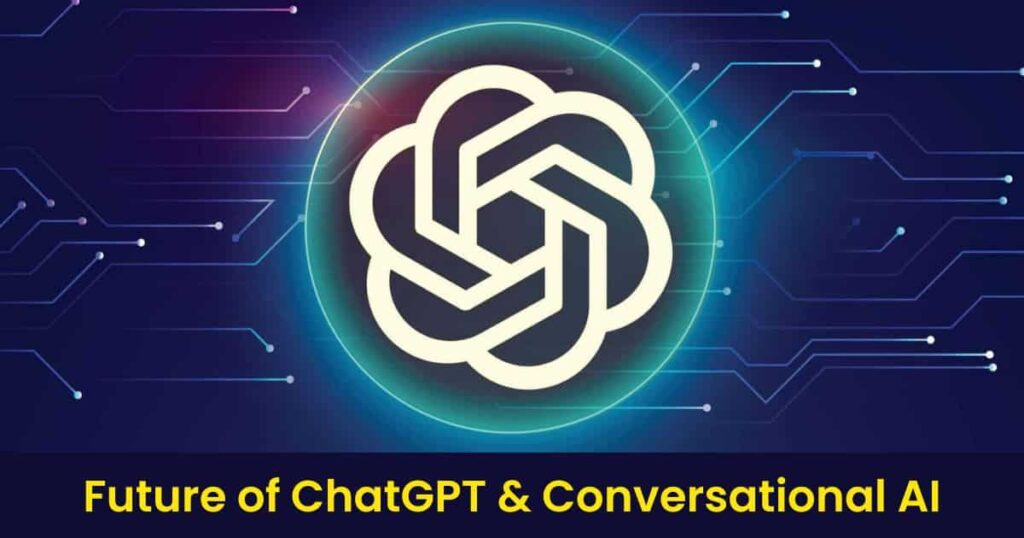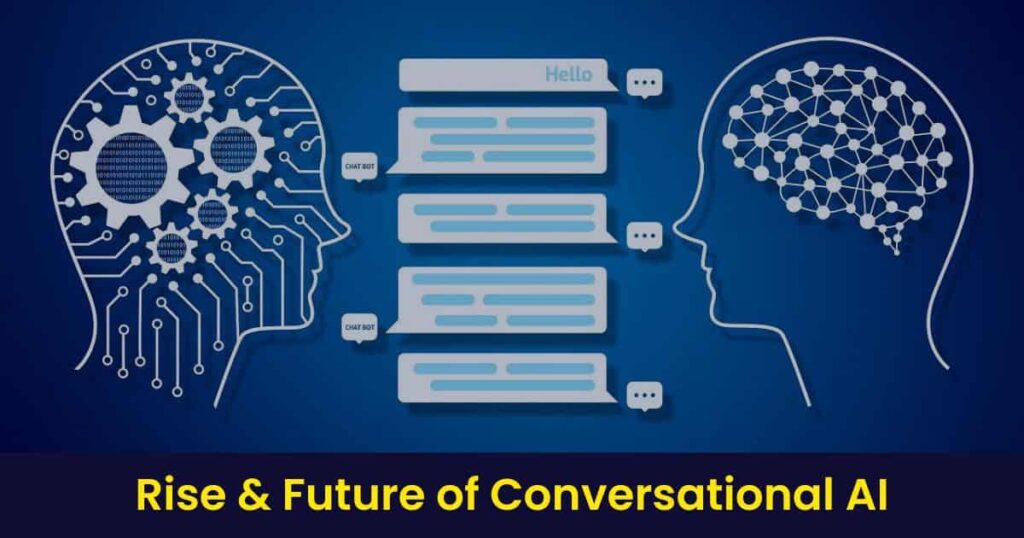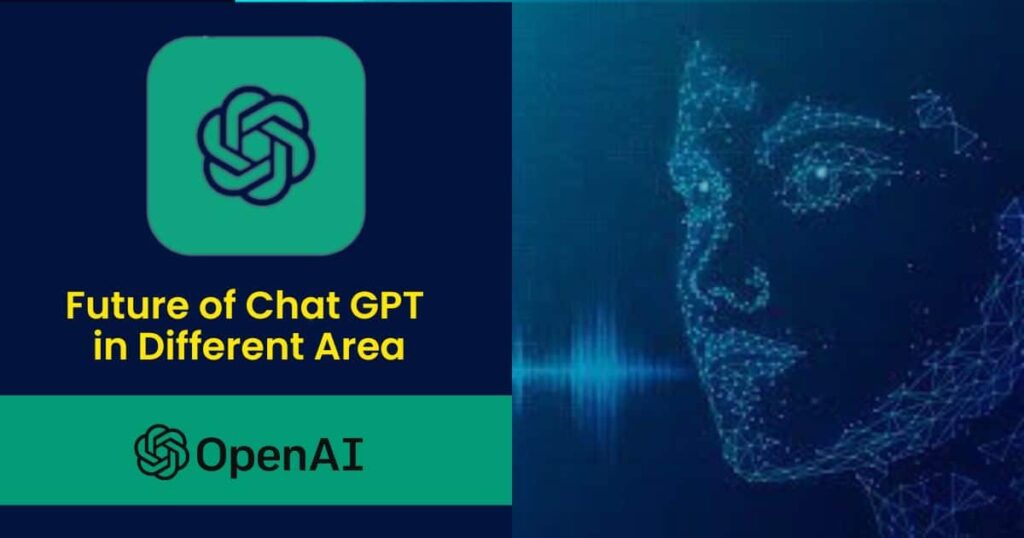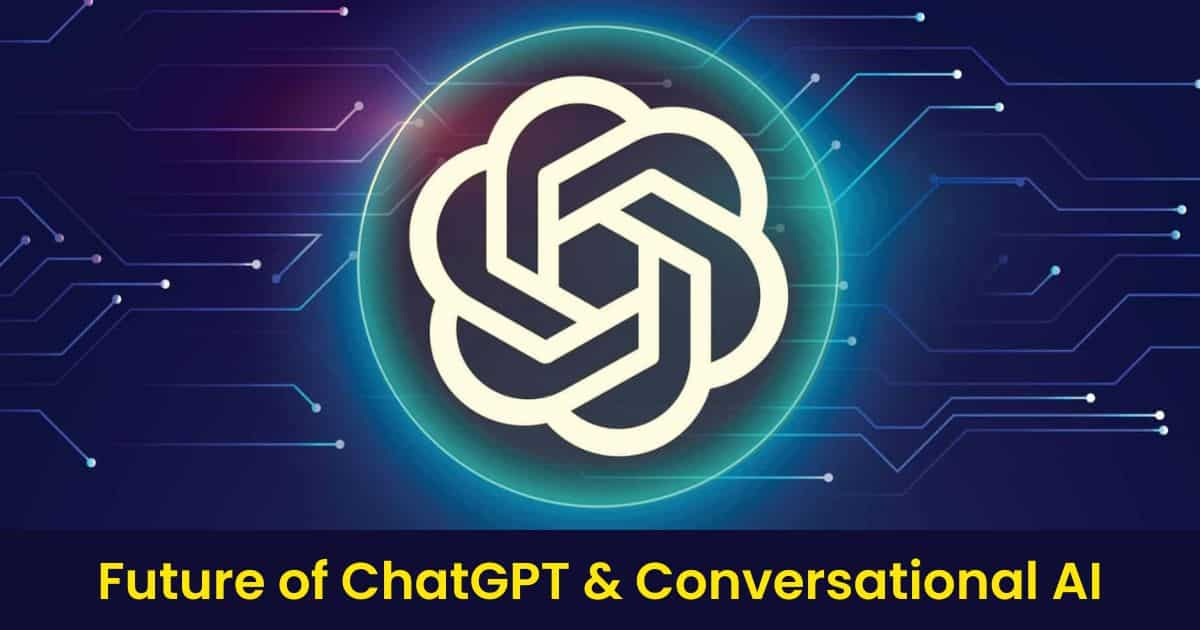The Future of ChatGPT and conversational AI is a topic that is generating a lot of excitement in the tech community. the Future of ChatGPT and conversational AI is an exciting and rapidly evolving field that is worth paying close attention to.

Artificial Intelligence (AI) has been a rapidly evolving field over the past few decades, leading to the development of some of the most sophisticated systems we have today. One of the most significant advancements in AI has been the creation of conversational AI, which has the ability to interact with human beings in natural language. The advent of conversational AI has been game-changing and has led to the development of numerous innovative applications that have transformed various industries, including healthcare, finance, retail, and customer service.
One of the most notable examples of conversational AI technology is ChatGPT, a language model developed by OpenAI. So what is Chat GPT and How it Works ?. Well, ChatGPT is a cutting-edge AI system that has the capability to converse with humans in a natural, human-like manner. The model is trained on a massive corpus of text data, enabling it to respond to a wide range of questions and topics with great accuracy and speed. by Reading all this you may have question about What is future of ChatGPT and Conversational AI
The Rise of Conversational AI
The rise of conversational AI can be attributed to several factors. One of the key drivers has been the increasing popularity of messaging and voice-based interfaces, such as voice assistants and chatbots. These interfaces have made it easier for people to communicate with computers, leading to a growing demand for AI systems that can understand and respond to human language.

Another key driver has been the exponential growth of data, which has enabled AI systems to learn from vast amounts of information. As more and more data has become available, AI systems have been able to develop an understanding of human language that is increasingly sophisticated. This has paved the way for the development of systems like ChatGPT, which have the ability to converse with humans in a natural and intuitive way.
The Capabilities of ChatGPT
ChatGPT is a language model based on the transformer architecture, which has been widely adopted in the field of natural language processing. The model is trained on a massive corpus of text data, allowing it to generate responses to a wide range of questions and topics with great accuracy and speed.
One of the most impressive aspects of ChatGPT is its ability to understand context. The model is able to use context to generate responses that are relevant to the conversation, making the interactions more natural and human-like. This is a significant improvement over previous language models, which were often limited in their ability to understand context.
Another key strength of ChatGPT is its versatility. The model can be used in a variety of applications, including customer service, language translation, and even creative writing. The model has been trained on a wide range of text data, enabling it to respond to questions and generate text on a vast range of topics, from science and technology to politics and entertainment.
The Benefits of ChatGPT
The benefits of ChatGPT are numerous and far-reaching. One of the key benefits is its ability to automate many tasks that were previously performed by humans. For example, ChatGPT can be used to provide customer service, answer frequently asked questions, and handle routine inquiries, freeing up valuable human resources for more critical tasks.
Another significant benefit of ChatGPT is its speed and efficiency. The model can generate responses to questions in real-time, enabling it to handle large volumes of requests in a short amount of time. This can significantly improve the speed and efficiency of various processes, from customer service to language translation.
Another important benefit of ChatGPT is its ability to personalize interactions. The model is able to understand context and generate responses that are relevant to the individual user. This can lead to more engaging and personalized interactions, improving the overall customer experience.
The Future of ChatGPT and Conversational AI

The future of ChatGPT and conversational AI is extremely promising. With advancements in AI technology and the growing availability of data, it is likely that conversational AI systems will become even more sophisticated and capable in the years to come.
Future of ChatGPT in conversational AI customer service.
One of the areas where we see Future of ChatGPT is likely to have a significant impact is in customer service. As the model becomes more sophisticated, it will become increasingly capable of handling complex customer inquiries, reducing the need for human customer service representatives. This could lead to significant cost savings for businesses and improved customer satisfaction through faster and more accurate responses.
Future of ChatGPT in language translation
Another area where we see future of ChatGPT is likely to have a major impact is in language translation. As the model becomes better at understanding and generating language, it has the potential to revolutionize the way people communicate across linguistic barriers. This could have far-reaching implications for global trade, travel, and diplomacy.
Future of ChatGPT in Creative Content writing
Another area where ChatGPT makes more impact is in creative writing. The model has been trained on a vast corpus of text, which allows it to generate text on a wide range of topics. This has led to some creative applications, such as poetry and fiction writing, where the model can be used to generate ideas and even complete pieces of writing. While it is unlikely that ChatGPT will replace human writers anytime soon, it has the potential to be a valuable tool for writers looking for inspiration or new ideas.
Future of ChatGPT in Creative Education
Another area where we see bright future for ChatGPT and conversational is likely to have a major impact is in education. The model has the ability to understand and respond to a wide range of questions, which makes it an excellent tool for students looking for information or clarification on a particular topic. This could lead to a more personalized and engaging learning experience, as students are able to get answers to their questions in real-time. Additionally, ChatGPT could be used to automate the grading of certain types of assignments, freeing up time for teachers to focus on other aspects of the learning process.
Future of ChatGPT in impacting our personal life
The potential benefits of ChatGPT and conversational AI are not limited to businesses and education. The technology has the potential to improve our personal lives as well. For example, ChatGPT could be integrated into virtual personal assistants, allowing us to interact with our devices in a more natural and intuitive way. Additionally, the model could be used to generate personalized recommendations for things like music, books, and movies, based on our individual preferences and history.
Concerns about ChatGPT & Conversational AI technology
While the potential Benefits of ChatGPT are numerous, there are also some Concerns about the ChatGPT and Conversational AI technology. One of the key concerns is the potential for the technology to be used for malicious purposes, such as creating fake news or spreading misinformation. It is important that steps are taken to ensure that conversational AI systems are used ethically and responsibly.
Another concern is the potential for conversational AI systems to replace human jobs. As the technology becomes more sophisticated and capable, there is a risk that it could automate many jobs that were previously performed by humans. This could lead to significant job losses and economic disruption, and it is important that steps are taken to ensure that the benefits of the technology are shared widely.
Conclusion on Future of ChatGPT & Conversational AI
In conclusion, ChatGPT is a cutting-edge conversational AI system that has the potential to transform many aspects of our lives. Its ability to understand and respond to human language, generate relevant responses, and automate many tasks make it an extremely powerful tool. While there are some concerns about the technology, it is clear that the potential benefits far outweigh the risks, and that ChatGPT is poised to play an increasingly important role in our lives in the years to come.
Thank You for Reading Our Blog. You can Also Read Our Recent Blogs :
- ChatGPT vs BARD – 7 Key Differences between OpenAI’s Chat GPT vs Google’s Bard Which is Better to use ?
- What is Chat GPT and How it Works ? – Top Benefits and Future of Chat GPT
Will ChatGPT replace Programmers ?
No, ChatGPT is not likely to replace programmers in the near future.
Programming involves the creation of algorithms and software systems that solve specific problems and automate tasks. While ChatGPT can generate code snippets and perform simple coding tasks, programming requires a level of creativity, logical thinking, and problem-solving skills that go beyond simply generating text.
Additionally, programming involves a deep understanding of computer systems, algorithms, and data structures, as well as the ability to design and implement complex systems. ChatGPT, as a language model, does not have the capability to understand the underlying concepts and principles of programming, and its generated code may not always be efficient, correct, or secure.
While ChatGPT can assist programmers by generating code snippets and performing simple coding tasks, it is not a replacement for human programmers. In the future, it is possible that AI and machine learning technologies, including language models like ChatGPT, will continue to augment and improve the work of programmers, but they are not likely to replace them completely.
In conclusion, ChatGPT is a valuable tool for programmers, but it is not a replacement for human programmers and their unique skills and expertise.
Will ChatGPT replace Google ?
No, ChatGPT is not likely to replace Google in the near future.
Google is a comprehensive search engine and technology company that provides a wide range of services and products, including search, advertising, email, cloud storage, and many others. ChatGPT is a language model developed by OpenAI that is capable of generating text based on patterns it learned from a large corpus of text data.
While ChatGPT can be used for various language-related tasks, such as answering questions, generating text, and translating text, it is not designed to replace a search engine like Google. The primary goal of Google is to provide users with relevant information in response to their queries, while ChatGPT’s primary goal is to generate text that resembles human language.
Additionally, Google’s search algorithms take into account many factors, such as the relevance and reliability of information, to provide users with the most accurate and useful results. ChatGPT does not have access to these algorithms, and the text it generates may not always be accurate, relevant, or trustworthy.
In conclusion, while ChatGPT is a powerful language model with many potential applications, it is not designed to replace Google or other search engines. Google is a comprehensive technology company with a wide range of services and products, and it is unlikely to be replaced by a single AI model in the near future.
Will ChatGPT replace Jobs ?
It is possible that the use of ChatGPT and other artificial intelligence technologies may have an impact on certain jobs and industries in the future, but it is unlikely to replace jobs entirely.
While AI and machine learning models like ChatGPT can automate some tasks that were previously performed by humans, they are not capable of completely replacing human labor in many industries. For example, AI can assist with tasks such as data analysis, customer service, and content creation, but it is not capable of replacing the human element in fields such as creative arts, education, and healthcare, which require empathy, creativity, and critical thinking.
Additionally, the use of AI in certain industries may also create new job opportunities, such as roles in AI development, implementation, and management.
In conclusion, while the use of ChatGPT and other AI technologies may have an impact on certain jobs and industries, it is unlikely to replace jobs entirely. The integration of AI and human labor is likely to lead to a transformation of the job market, with new opportunities emerging and certain tasks being automated, but the demand for human skills and expertise will continue to be an essential aspect of many industries.
Will ChatGPT replace Writers ?
It is unlikely that ChatGPT will replace writers in the near future.
Writing is a complex and creative process that involves more than just generating text based on patterns learned from data. It involves the ability to express thoughts, emotions, and ideas in a clear and compelling manner, to convey information effectively, and to engage an audience through storytelling and other literary devices.
While ChatGPT can generate text based on patterns it learned from a large corpus of text data, it lacks the creativity, critical thinking, and emotional intelligence that are essential to writing. The text generated by ChatGPT may be useful as a starting point or for completing certain simple tasks, but it may not always meet the standards of quality, originality, and authenticity that are expected of human writers.
Additionally, writing is a human-centered process that requires empathy, intuition, and a deep understanding of the audience and their needs. ChatGPT, as a language model, does not have the capability to understand human emotions, motivations, and behavior, and it may not always be able to produce writing that is engaging and relevant to the reader.
In conclusion, while ChatGPT may be a useful tool for writers and can assist with certain writing tasks, it is unlikely to replace human writers in the near future. Writing is a complex and creative process that requires human skills and expertise, and it is unlikely that AI models like ChatGPT will be able to fully replace human writers in the near future.
Why ChatGPT is Scary ?
Some people might view ChatGPT and other artificial intelligence (AI) technologies as being scary for several reasons:
Uncertainty about the future: The rapid development of AI and machine learning technologies has raised concerns about the potential impact on society and the job market, leading to uncertainty and fear about the future.
Fear of loss of control: As AI technologies like ChatGPT become more advanced, there is a fear that they may become too complex for humans to understand and control, leading to a loss of control over the technology.
Ethical concerns: There are also ethical concerns about the use of AI technologies, such as the potential for AI systems to perpetuate biases and discrimination, or to be used for malicious purposes.
Fear of the unknown: AI technologies like ChatGPT are relatively new, and many people may not fully understand how they work, leading to a fear of the unknown and a lack of trust in the technology.
It is important to understand that AI technologies like ChatGPT are designed to assist and augment human capabilities, not to replace or control them. As with any new technology, it is important to approach AI with a critical and informed perspective, and to ensure that it is developed and used in ways that promote the welfare and well-being of society.


